Mother Tongue Languages Programme
The Mother Tongue Languages Department is committed to delivering top-quality Mother Tongue Language programmes that intrinsically motivate and inspire Dunmanians to use and enjoy the Mother Tongue Languages. Our experienced team of teachers has designed a variety of programmes for the students to choose from according to their interests.
在致力于为学生提供优质多元课程、并寓乐于教的理念的指引下,在强大的师资力量的支持下,我们为学生精心设计了丰富多元的母语课程,供学生根据自己的兴趣爱好灵活选择。
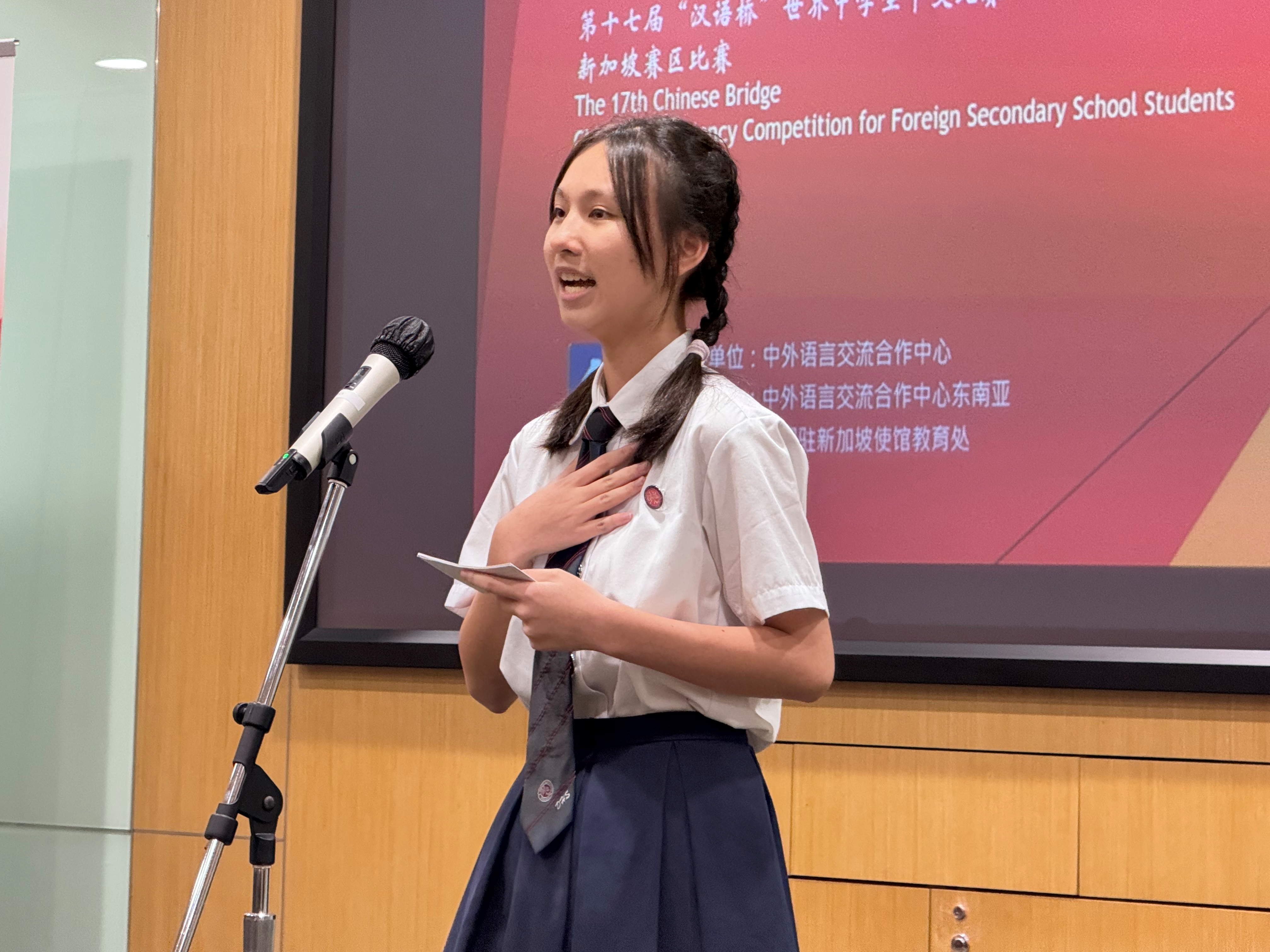
Curriculum
Subjects Offered by MTL Department
母语部所提供的科目
|
Junior High 初中部 |
Senior High 高中部 |
|
|
1 |
GCE ‘O’ Level Higher Chinese/ Chinese (Compulsory for Year 1 to Year 4)
|
Chinese Language ‘B’
|
|
2 |
Appreciation of Chinese Culture
|
H2/H3 Chinese Language & Literature
|
|
3 |
Conversational Malay
|
H2 China Studies in Chinese (Compulsory for BSP Students)
|
|
4 |
Literature in Chinese
|
H2 Translation (Chinese)
|
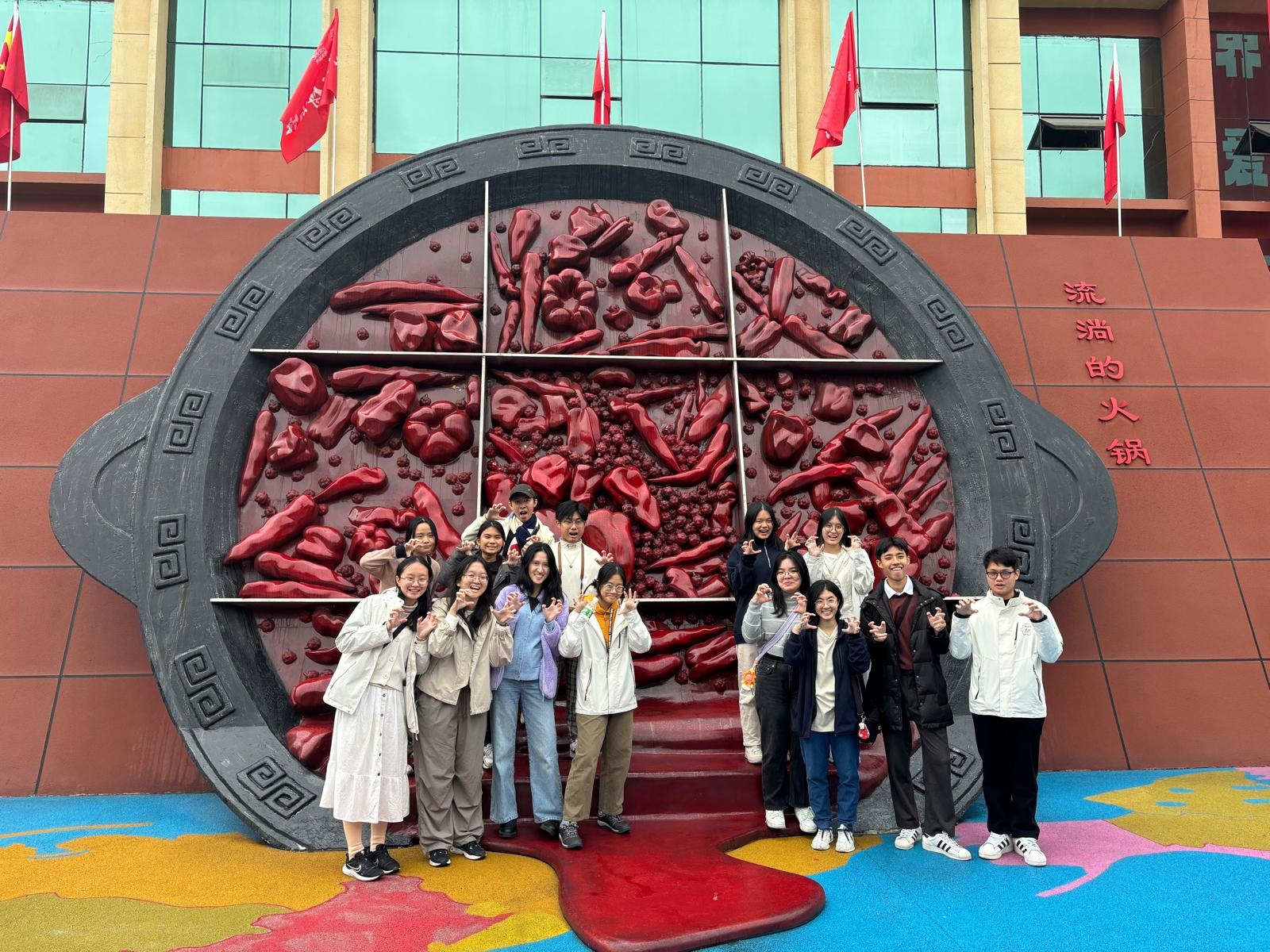
Special Programmes Offered by MTL Department
母语部所提供的特别课程
|
Junior High 初中部 |
Senior High 高中部 |
|
|
1 |
Bicultural Studies Programme
|
Bicultural Studies Programme
|
|
2 |
Chinese Language Elective Programme at Secondary Level
|
Chinese Language Elective Programme at JC Level
|
|
3 |
Malay Special Programme
|
Content
Subjects Offered by Junior High
初中部所提供的科目
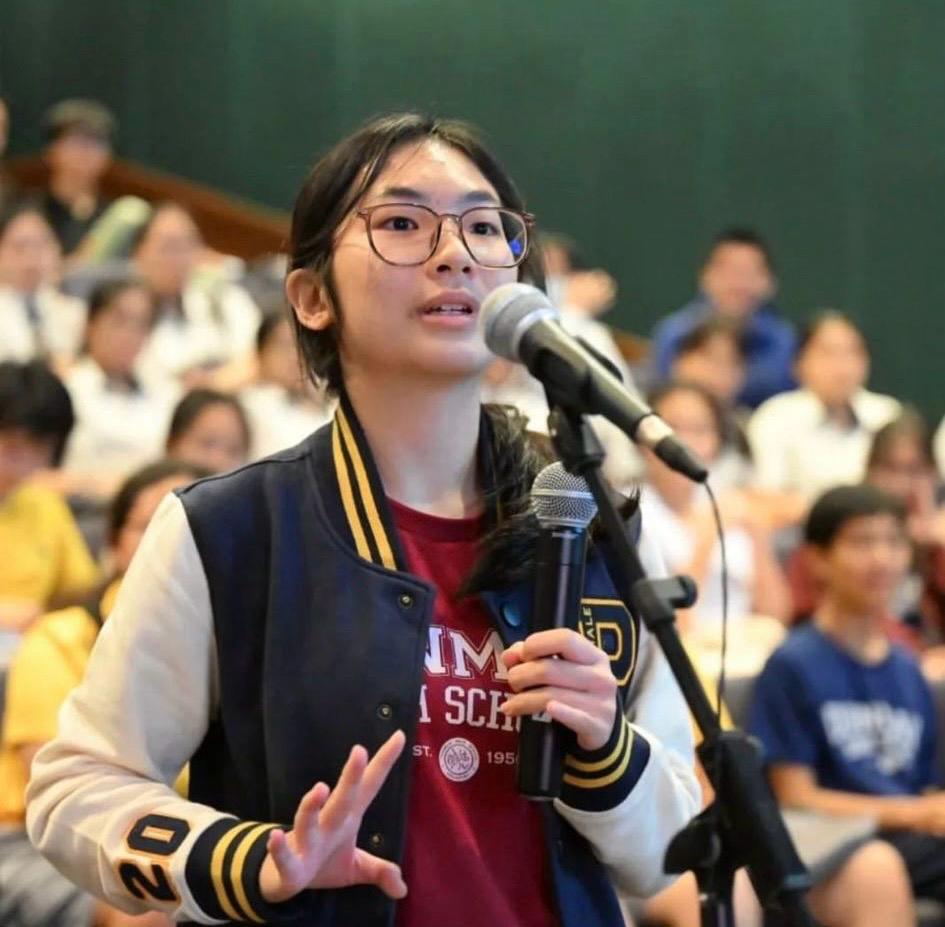
1. GCE ‘O’ Level Higher Chinese/ Chinese
‘O’ 水准高级华文/华文
The Higher Chinese / Chinese curriculum at Dunman High School aims to foster a joyful and meaningful learning experience, while nurturing students to become confident and proficient users of their Mother Tongue Language. Anchored on the core pillars of Communication, Culture, and Connection, the curriculum seeks to:
-
Strengthen students’ language and communication skills
-
Deepen their cultural understanding and appreciation
-
Develop broad-based competencies
我校的高华/华文课程,旨在营造愉快而有意义的学习体验,并致力于把学生培养为自信且熟练的母语使用者。课程以“沟通、文化与联系”三大核心为基础,目的是:
-
加强学生的语言能力与沟通技巧
-
深化学生的文化理解,提升其文学修养
-
培养学生广泛的综合素养
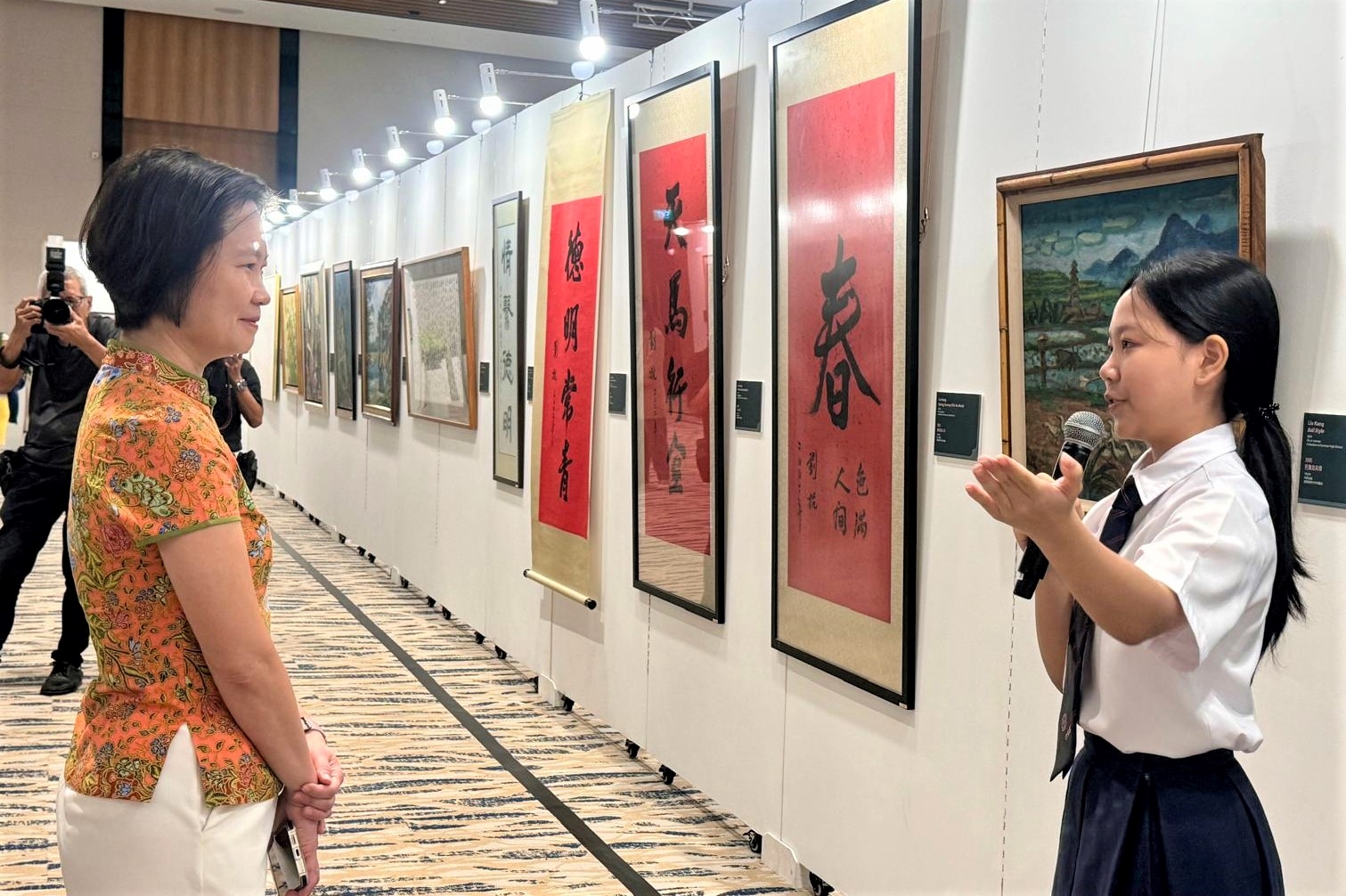
2. Appreciation of Chinese Culture
中华文史华艺鉴赏课程
The Appreciation of Chinese Culture curriculum aims to provide students with foundational knowledge and deepen their appreciation of Chinese history, literature, philosophy, and culture—including aspects of Singaporean Chinese culture. Lessons are thematically designed, covering key topics in Chinese history, literature, and cultural heritage. The programme also incorporates experiential learning through a series of hands-on workshops. These include traditional art forms such as Beijing Opera, Chinese Brush Painting, Calligraphy, Tea Appreciation, and Crosstalk, alongside modern expressions like Chinese Radio Drama.
中华文史华艺鉴赏课程旨在帮助学生建立扎实的基础知识,并加深他们对中国历史、文学、哲学与文化的理解与欣赏,其中亦涵盖新加坡华族文化的相关内容。课程内容依据教育部修订课程纲要,围绕中国历史、文学与文化遗产等主题进行设计。
课程亦融入体验式学习,透过一系列实践工作坊,让学生亲身感受中华文化艺术的魅力。这些活动涵盖传统艺术形式,如京剧、国画、书法、茶艺与相声,以及现代艺术形式,如华语广播剧。

3. Conversational Malay
马来语会话
Dunman High School offers the Conversational Malay Programme to enable students to communicate with Malay-speaking peers. This compulsory programme for Year 1 and 2 students aims to develop our students’ ability to speak and understand simple Conversational Malay. They will learn basic sentence structures and vocabulary for everyday situations. By the end of the programme, our students should be able to:
-
Understand simple spoken Malay Language
-
Ask and answer questions using simple Malay Language
-
Show an awareness and appreciation of Malay Culture
德明政府中学开设马来语会话课程,旨在提升学生与马来语使用者交流的能力。本课程为中一及中二学生的必修课程,旨在培养学生基本的马来语听说能力,使其掌握日常交流所需的基础句型和词汇。课程结束后,学生将能够:
-
理解简单的马来语
-
以简单的马来语进行问答交流
-
展现对马来文化的认识与欣赏
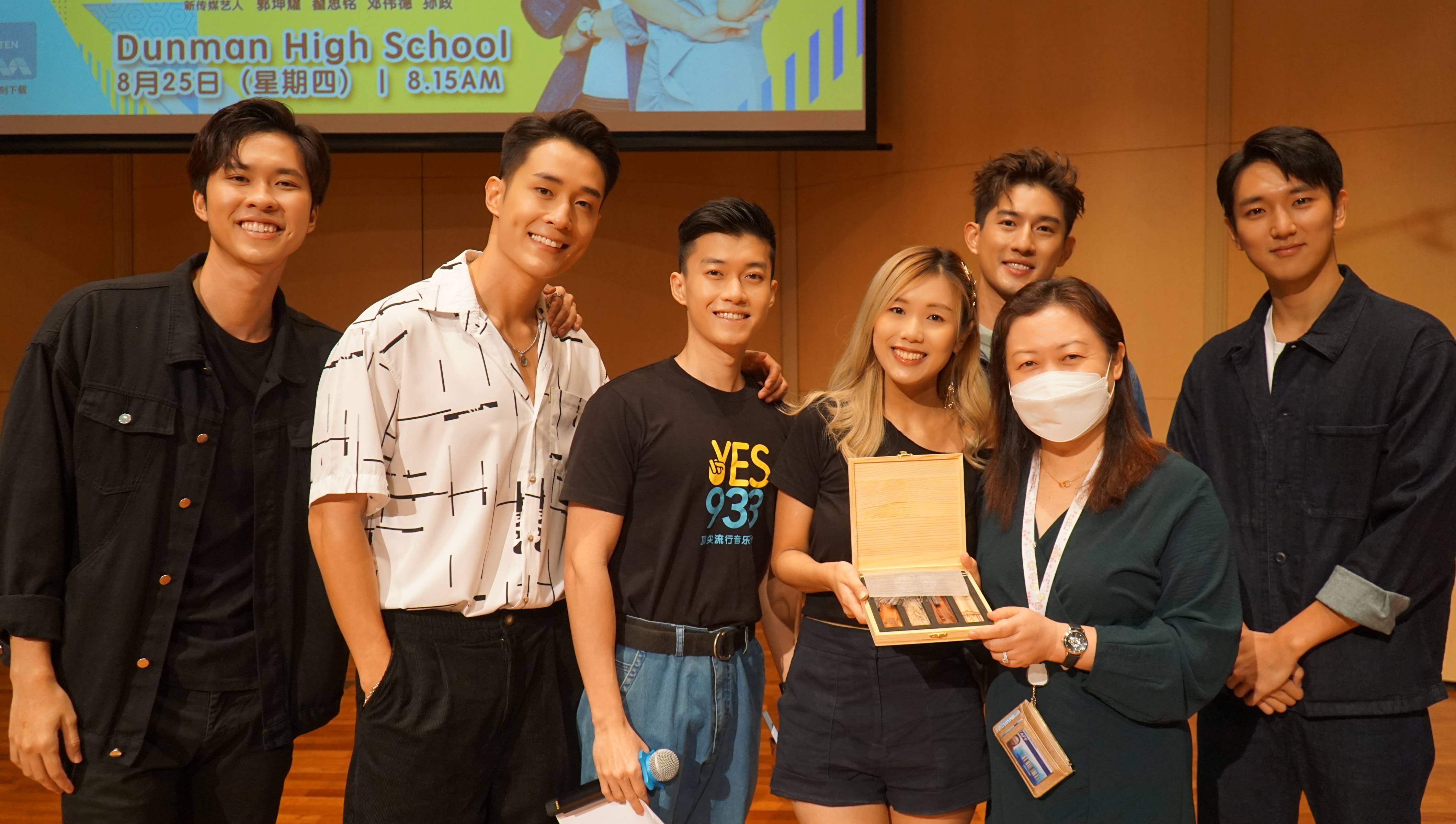
4. Literature in Chinese
华文文学
The Literature in Chinese curriculum aims to nurture literary enthusiasts, reflective readers, critical thinkers, and creative minds with a global perspective. Through close reading and appreciation of literary works, the curriculum deepens students' understanding of themes, enhances critical reading skills, fosters interest in Chinese literature, and strengthens their understanding of Chinese culture.
华文文学课程旨在培养学生成为热爱华文文学的阅读者、善于省思与批判的思维者、具备全球视野的思辨者,以及富有创意的表达者。课程以文学作品为载体,带领学生由点及面地深入研读与赏析,探究作品的主题意涵与文化内涵,激发他们对华文文学的兴趣,并提升其文学鉴赏力、批判性阅读能力与人文素养。课程亦通过文化与现实的对话,引导学生深化对华族文化的理解与认同,在多元语境中建构自我认知,拓展思维边界,培育兼具本土根基与国际视野的新时代学习者。
Subjects Offered by Senior High
高中部所提供的科目
1. Chinese Language ‘B’ /H1 Chinese Language/H1 Malay Language/ H1 Tamil Language
华文 ‘B’/H1华文/H1 马来文/H1 淡米尔文
Anchored on a framework of three broad themes, Culture, Relationship and Change, the H1 Mother Tongue Language (H1 MTL) and Mother Tongue Language ‘B’ curriculum aim to nurture engaged learners of MTL. At the end of the course, H1 MTL students will be able to:
-
communicate effectively in their MTL
-
understand and develop their national and cultural identity through a deeper appreciation of culture, traditions, literature and history.
-
hone their higher order thinking skills while further refining their MTL proficiency
H1 母语(H1 MTL)和母语 ‘B’ 课程以“文化”、“关系”和“变化”三大主题为核心,旨在培养乐于学习、善于运用母语的学习者。课程结束后,H1 MTL 学生将能够:
-
有效地使用母语与他人沟通。
-
对母族文化、文学、历史与与价值观有更深入的认识,并产生国家与文化认同感。
-
培养高阶思维,从而加强各种语言技能的掌握。
2. H2/H3 Chinese Language and Literature
H2/H3华文与文学
The H2 & H3 Chinese Language and Literature syllabus adopts the thematic approach with broad themes guiding the teaching and learning of language and literature. Teachers will employ a variety of learning activities and tasks in class for students to apply and develop their communication skills via discussion, presentation, reading and writing assignments etc. Teachers will develop students’ higher order thinking skills, strike a balance between pen-based writing and computer-based text input, and expose students to a wide variety of texts including literary texts and authentic texts, both prescribed and non-prescribed.
H2和H3华文与文学的课程目标遵循21世纪技能框架,让学生能够学习并掌握相关的技能,例如沟通、协作与资讯科技技能;公民意识、环球意识与跨文化沟通技能以及批判与创意思维。课程由“三大主题(关系、变化和选择)” 、“语文教学”和“文学教学”三个元素组成。教师设计丰富多元的综合性学习活动,通过分析真实语料和文学哲理篇章,鉴赏指定文学作品和课外文学作品,强化学生的语文和文学技能,让H2和H3华文与文学课程的学生达到课程目标。
3. H2 China Studies in Chinese
H2 中国通识
The H2 China Studies in Chinese curriculum focuses on studying developments in contemporary China from circa 2000 to the present day through an examination of its economy, politics, society and international relations. The curriculum aims to equip students with relevant knowledge on contemporary developments in China, develop their critical thinking and information literacy to understand these developments, and instil in them an awareness of the regional and global implications of China’s rise.
中国通识课程的目标是让学生通过探讨2000年以后中国经济、政治、社会和国际关系等课题,了解当代中国的发展。课程的制定参照了21世纪技能框架及学生学习成果。学生在研究当代中国时所接触的不同资料,能训练他们批判性和有效性地获取、分析、评价和运用各种信息,从而培养学生的信息素养。学生在研究中国国内发展和国际关系时,能更好地从新加坡的角度了解中国和亚洲乃至全世界的关系,从而培养学生的环球意识和跨文化技能。
4. H2 Translation (Chinese)
H2 翻译(华文)
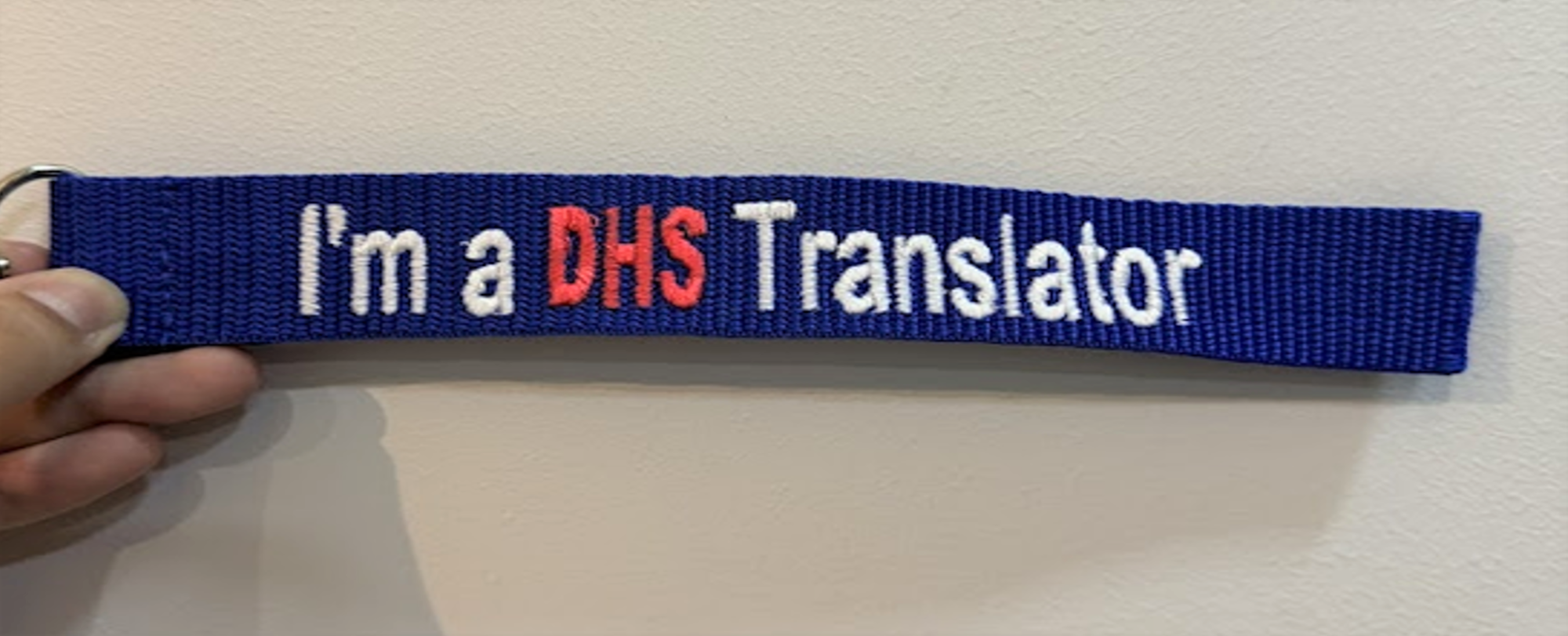
H2 Translation (Chinese) is a Chinese-medium Humanities subject designed to encourage students’ interest in both the Chinese and English language, develop students’ capacity in inter-lingual and cross-cultural communication as well as critical and inventive thinking skills through the analysis of practical issues associated with communications across languages and cultures. H2 Translation (Chinese) is made up of two components, linguistics and translation. The linguistic component provides students with the tools and aptitude for systematic analysis of both the English and Chinese languages. The translation component builds upon this foundation and provides students with the strategies and theories of translation, which enable them to perform translations, critically analyse translations as well as appreciate cultural contexts in translation.
H2翻译(华文)课程是一门以华文为媒介语的人文科目,旨在通过分析与跨语言和跨文化交流相关的实际问题,激发学生对中英两种语文的兴趣、同时培养学生跨语言和跨文化沟通的能力,以及批判性和创造性思维的能力。课程由“语言学” 与“ 翻译学”两个部分组成。语言学旨在培养学生系统分析中英两种语言的能力。翻译学则建立在语言学的基础上,引导学生掌握翻译理论知识和翻译策略,让学生懂得如何根据翻译任务、翻译环境和翻译对象适当地进行翻译实践,并提高学生对翻译作品的批判性鉴赏能力。
Special Programmes offered by MTL Department
母语部提供的特别课程
1. Bicultural Studies Programme (BSP)
双文化课程
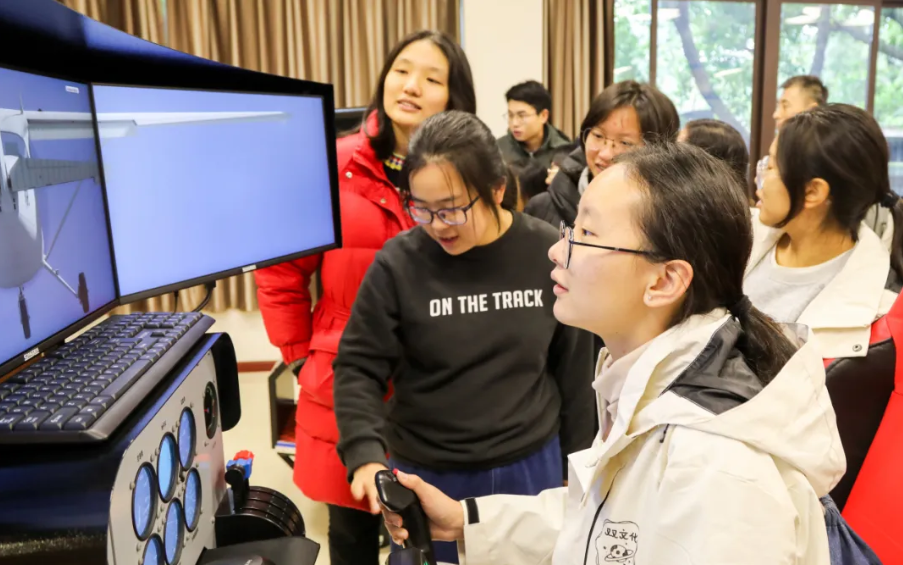
The Bicultural Studies Programme (MOE) [BSP] is a 4-year programme offered by MOE that spans from Year 3 (Sec 3) to Year 6 (JC 2). It aims to develop bicultural and bilingual talents who can effectively interact with China and the West and have the capacity to engage in key issues relating to contemporary China with cross-cultural perspectives.
Students from the BSP will jointly participate in two signature activities organised by MOE, including a three-day camp held locally during the June holidays of Year 3 and the annual BSP Symposium during the March holidays of Year 4 and 5. School based enrichment programmes include overseas immersions, learning journeys, inter-school forums, and lectures.
Outstanding Singapore Citizens selected for the BSP will receive an annual scholarship allowance of $1,000. School fees will also be covered, subject to an annual cap of $2,400. They will also receive subsidies for overseas immersion programmes to China and Southeast Asia for up to 8 weeks and to a Western country for up to 2 weeks over 4 years. As part of the scholarship requirements, BSP scholars must offer H2 China Studies in Chinese as one of their subjects for the GCE ‘A’ level Examinations.
Apart from the BSP scholarship programme, the school also offers the 2-Year BSP non-scholarship programme to students from Year 3 to Year 4. Students onboard the non-scholarship programme will participate in the same learning activities as the BSP scholars. However, study immersion trip opportunities are subjected to availability of vacancies and selection criteria.
For more information on the BSP, please click HERE.
教育部双文化课程 (Bicultural Studies Programme (MOE)),简称BSP,是一门为期四年(从中三到高二)的奖学金课程。课程旨在培养一批具有双语能力、能深入理解中国,同时具备与西方沟通能力的双文化人才。
在四年课程中,学生将从跨文化的视角,深入探讨与当代中国发展相关的重要课题。他们也将有机会由教育部主办的两项标志性活动:
-
中三年中假期的双文化营。时长为三天。
-
中四及高一三月假期进行的双文化课程研讨会。时长为一天。
除课堂学习外,学校亦会提供丰富的延伸学习机会,如海外浸濡学习、实地考察、校际论坛与专题讲座等,进一步提升学生的文化理解与思辨能力。
获颁双文化奖学金的学生每年可获得 1,000新元津贴,学费亦可获豁免(每年上限为 $2,400),并享有海外浸濡活动津贴。此外,他们也将参与由教育部资助的8周中国或东南亚地区及2周西方国家的浸濡体验。根据教育部要求,双文化奖学金学生在高中阶段必须修读 H2 中国通识(H2 China Studies in Chinese),作为GCE ‘A’ 水准考试的一个科目。
除了奖学金课程以外,我校也提供教育部双文化非奖学金课程(从中三到中四)让中二学生报名参加。非奖学金课程的学生仍有机会参与双文化学习营与研讨会等活动。浸濡活动方面,则须依学生人数情况而定。申请参加浸濡活动的学生也必须符合申请条件。
欲知更多有关双文化课程的详情,请点击此处。
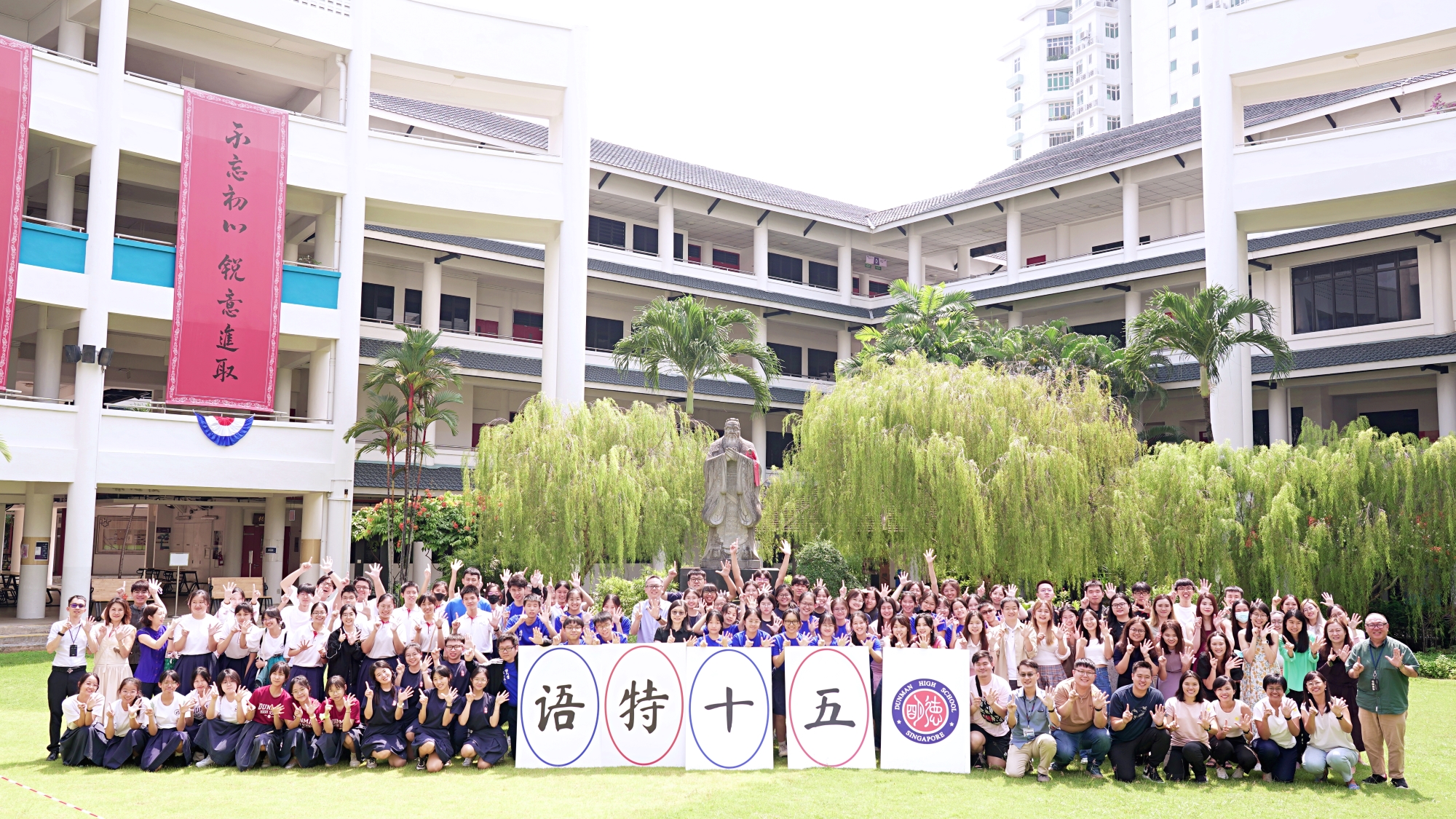
2. Chinese Language Elective Programme at Secondary Level
教育部初中华文语文特选课程(初中语特)
The Chinese Language Elective Programme at Secondary Level (CLEP-Sec) was introduced by the Ministry of Education in 2020. It aims to nurture promising students to attain a high level of language proficiency in Chinese, and enhance their understanding of Chinese literature. The programme also aims to develop these students to become effectively bilingual so as to better serve the needs of our nation.
Students from the CLEP-Sec centres will jointly attend two signature activities organised by MOE. A one to two-day camp will be held locally during the June holidays of Secondary 3 with a focus on Post-Secondary Educational Institutions’ (PSEI) MTL Pathways and CL-related interests. A one to two-week overseas immersion programme will be organised towards the end of Secondary 3. Students will also participate in school-based activities and programmes such as literary lectures, Meet-the-Author sessions, enrichment workshops, project work competition etc.
Outstanding Singapore Citizens selected for the CLEP-Sec will receive an annual scholarship allowance of $1,000. School fees will also be covered, subject to an annual cap of $2,400. Subsidy for overseas immersion trip will also be given. The duration of the programme is two years, from Secondary 3 to 4. Recipients are not required to enter into a bond with the Singapore government.
For more information on the Chinese Language Elective Programme at Sec Level (MOE), click HERE .
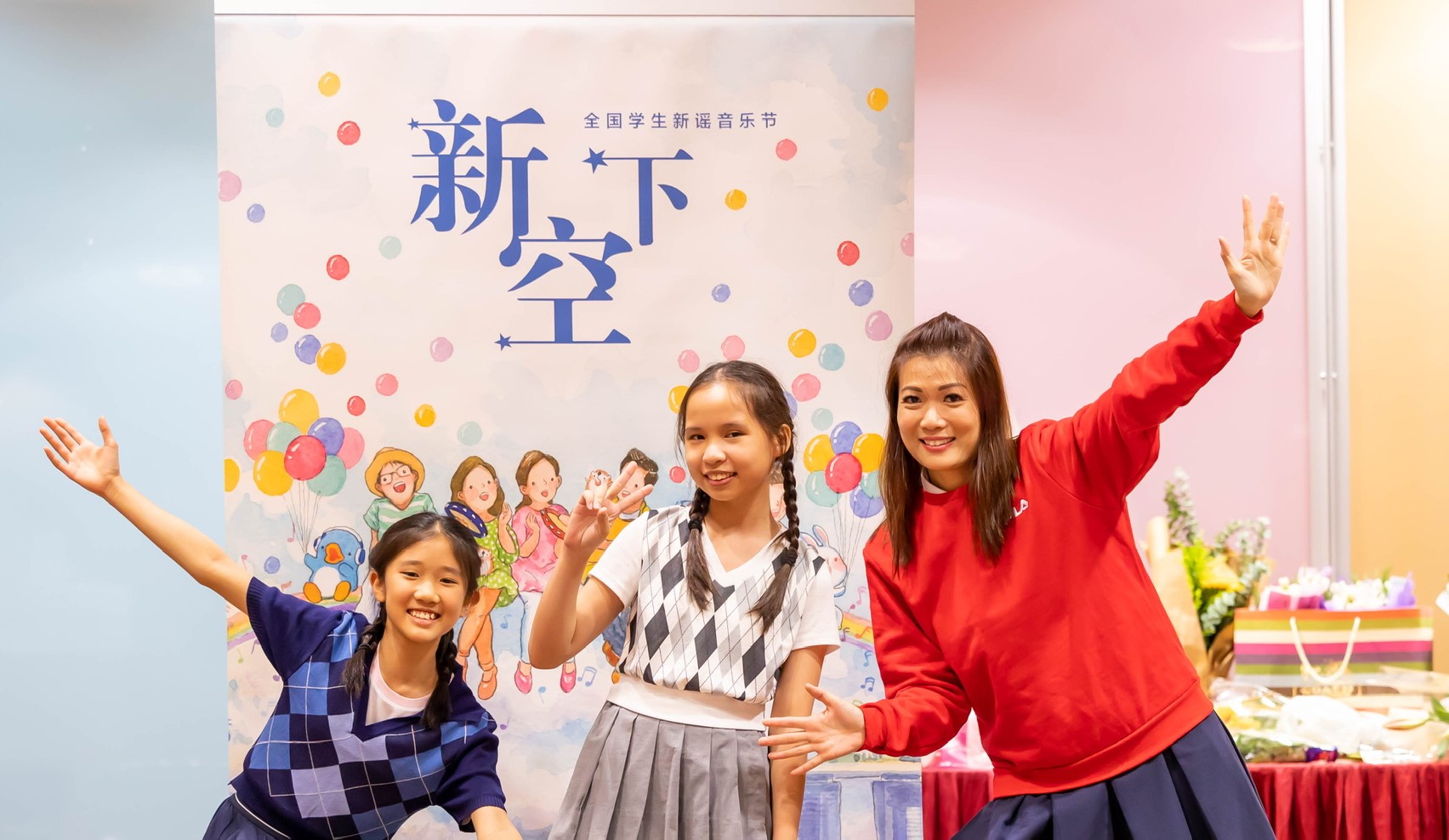
中学华文特选课程(Chinese Language Elective Programme at Secondary Level,简称 CLEP-Sec)由新加坡教育部于2020年推行,旨在培养发掘有潜质的学生,帮助他们在华文语言能力与文学素养方面达到更高水平,同时提升他们的双语能力,以更好地满足国家发展的需要。
修读语特的学生将共同参与由教育部主办的两项标志性活动。包括:
-
中三年中假期的本地营会。内容聚焦于初级学院和大专院校的母语学习路径,以及与华文相关的兴趣领域。时长为一至两天。
-
中三年尾进行的海外浸濡学习活动。此项活动供奖学金生参加,为期一至两周。
此外,学生也将参与学校层面的活动与课程,例如文学讲座、作家见面会、深广课程、专题探究、相关比赛等。
获颁语特奖学金的学生每年可获得 1000新元津贴,学费亦可获豁免(每年上限为 $2,400),并享有海外浸濡活动津贴。课程为期两年(中三至中四),学生无需与新加坡政府签署服务合约。
如需更多有关中学华文语文特选课程的资料,请点击此处。
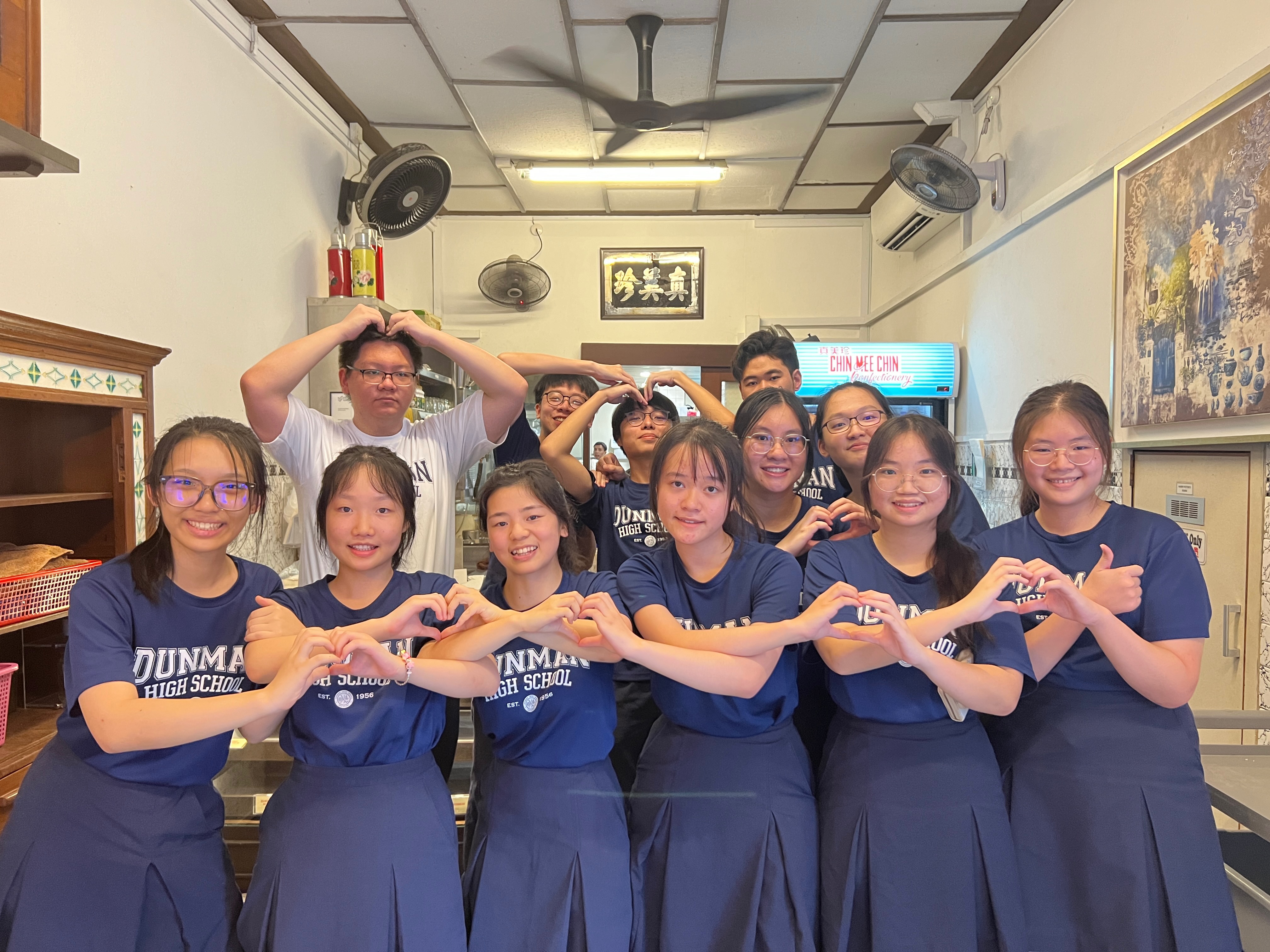
3. Chinese Language Elective Programme at JC Level
教育部高中华文语文特选课程 (高中语特)
The Chinese Language Elective Programme (CLEP) (JC) is an A-Level programme introduced by the Ministry of Education in 1990 to nurture the language talent of students who have an aptitude for the Chinese language so that they can attain a high level of proficiency and enhance their understanding and appreciation of Chinese literature. The programme also aims to develop academically able students to become effectively bilingual so as to better serve the needs of our nation. Dunman High School is one of the 5 CLEP centres in Singapore.
The CLEP provides a wide range of activities to enhance students’ learning and cultivate a deeper interest in Chinese language and culture, including literary lecture series, camp, creative writing for publication in literary magazines, immersion trip to China or Taiwan, internship at Singapore Press Holdings, Mediacorp or National University of Singapore, and school-based projects. All students under this 2-year programme must offer H2 Chinese Language and Literature (H2CLL) as one of their A-Level subjects.
Outstanding Singapore Citizens selected for the CLEP will be eligible for the MOE CLEP Scholarship. Each scholarship is valued at $1000 per annum, includes waiver of school fees, full subsidy for the immersion trip to China or Taiwan and is tenable for 2 years subject to the scholar’s satisfactory progress and performance at the end of Year 5 (JC1). Scholarship recipients are not required to enter into a bond with the Singapore Government.
For more information on the Chinese Language Elective Programme at JC Level (MOE), click HERE.
华文语文特选课程 (语特) (Chinese Language Elective Programme at JC Level,简称 CLEP-JC)是一门高中课程,旨在栽培精通双语的人才,并提高学生的华文水平和文学素养。
本课程为期两年,提供学生机会参与多姿多彩的学习活动,例如文学讲座系列、语特营、海外浸濡计划 (北京/上海/台北)、出版文艺刊物、实习计划和校本专题研究等。
参与语特课程的学生,在高中必须修读H2华文与文学 (H2 Chinese Language & Literature)。杰出的本地公民学生可参加面试,获颁华文语文特选课程奖学金。奖学金为期2年,学生每年可获1000新元,同时豁免学费。
欲知更多有关高中语特的详情,请点击这里。
4. Malay Special Programme (Year 1 - Year 4)
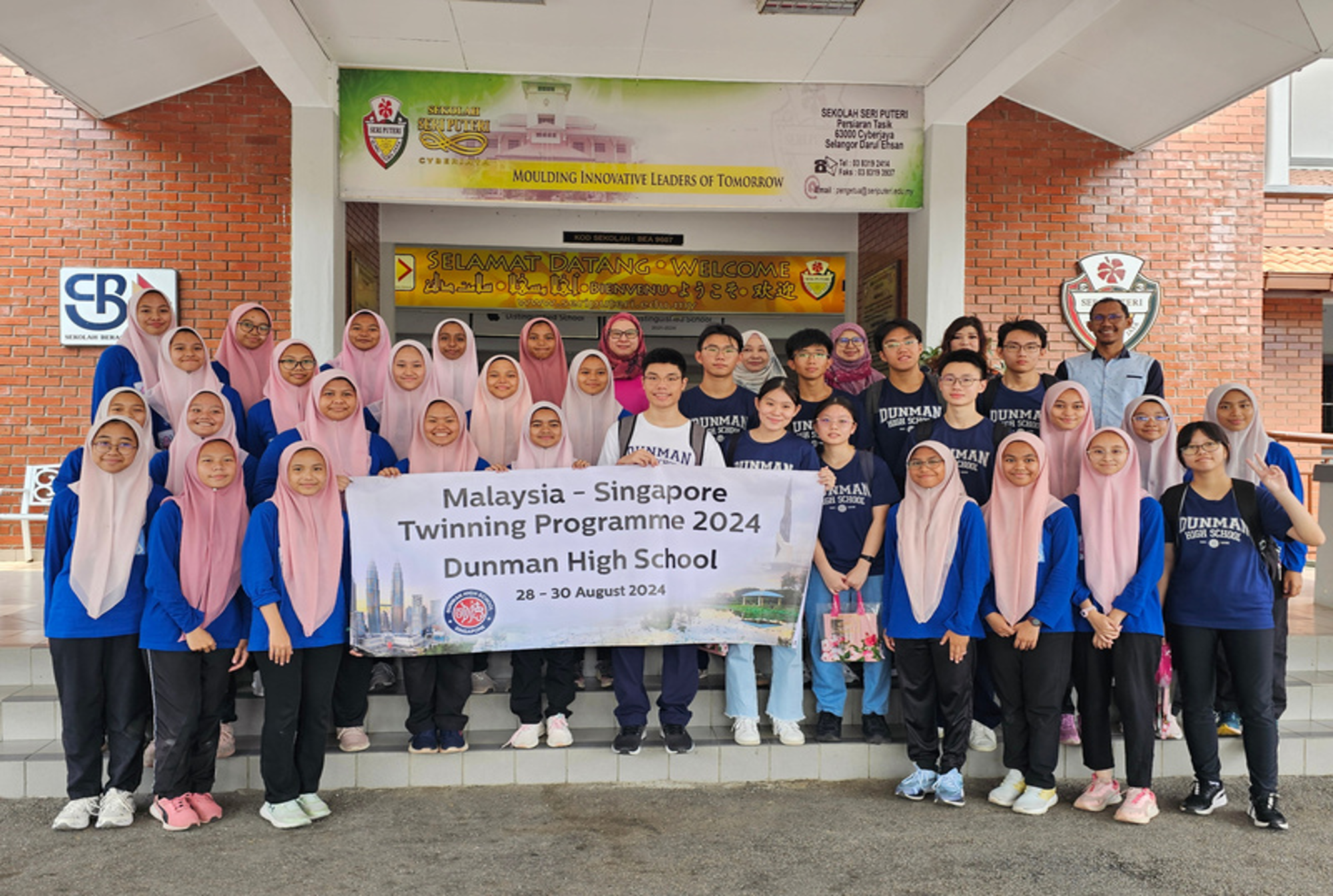
The Malay Special Programme (MSP) is offered to pupils who are interested and inclined towards learning the Malay language and culture. This third language subject is conducted in-house and is facilitated through weekly lessons and various enrichment opportunities. Through the span of four years, students offering MSP are equipped with the necessary skills to articulate and write like a native Malay student.
In recent years, Dunman High’s MSP has been organising her very own annual National Scrabble Competition (Sahibba WOW!) and National MSP Essay Writing Competition (Tari Pena). These events have provided a highly interactive learning environment for all MSP students in Singapore to showcase their oratorical and writing skills. Apart from the academic takeaways, the MSP also aims to further enhance the understanding of the Malay culture among the students.
Through our Twinning Programme with Sekolah Seri Puteri of Cyberjaya, Malaysia, students are exposed to the unique intricacies and traditions of the Malay culture as they encounter eventful experiences and interactions with native Malay speakers, further developing their cultural quotient.
MSP Students will sit for the end-of-year exam comprising oral and written components. The components for written assessments include essay, grammar and comprehension. Students may use MSP as a relevant subject for the calculation of their Grade-Point-Average (GPA). At the end of 4 years, students will sit for the O-Level MSP Exam.
Delivery
Our Mother Tongue Language teachers employ a plethora of pedagogies to improve students’ language abilities and cultural appreciation, nurturing them into passionate users of the language. Teachers differentiate their teaching methods based on students’ abilities and content.
Some of these methods include:
-
Verbal methods, for example direct instruction by teachers, peer discussion, oral presentations, etc.
-
Visual methods, for example demonstrations during lessons or fieldwork research, etc.
-
Experiential methods to train skills and techniques, for example practice, experimenting, immersion, etc.
In terms of teaching methods, teachers often use Socratic Questioning and Socratic Seminars to cultivate students’ critical thinking, encouraging students to voice their own perspectives, views and suggestions.
Teachers use Richard Paul’s Wheel of Reasoning model to guide students in their logical thinking process. Through the eight elements of thoughts, students will be able to consider problems, issues and perspectives.
Through classroom activities, students will practise making inferences, evaluating answers, recognising different perspectives and other logical deduction skills, all of which are essential to language learning.
母语老师以提升学生的母语能力和文化素养为宗旨,综合采用多样化的教学法,帮助学生活学善用。老师们也注意因材施教,针对不同学生和不同内容,灵活采用多种教学方法。
这些教学法基本包括:
-
以语言形式获得间接经验的方法,包括老师的讲授、同学之间的讨论、口头报告等;
-
以直观形式获得直接经验的方法,如演示法,田野考察等;
-
以实际训练形式形成技能、技巧的方法,如练习法,实验法,实习法,浸濡等。
在教学技巧上,老师们也常使用苏格拉底提问法和苏格拉底研讨会来培养学生批判性思考的能力,并鼓励学生提出自己的看法、意见和建议。
老师也使用保罗思维模式来引导学生进行逻辑性思考。通过有效思考的八个元素,学生学会仔细和有意义地思考问题、课题及观点。通过活动,学生也练习提出推论、评估答案、辨识不同角度的观点以及其他逻辑理论等技能,而这些技能是各个语言学科的主要技能。
为了强调华文课程和生活的联系,老师们尽可能选用最真实的语料。比如,通过演讲辞、广告以及新闻篇章,学生不但能提升语感,也能更好地体会华文在生活中的实用性。每周定期的读报活动,也让学生更关心时事,了解社会,从而培养“心系祖国,放眼世界”的情怀。
In our Chinese Language teaching and enrichment programmes, we adopt a wide range of innovative and interactive teaching strategies to create engaging, student-centered learning experiences that promote deeper understanding, critical thinking, and active participation. These strategies go beyond traditional lecture-based methods by incorporating real-world relevance, collaboration, creativity, and technology. The goal is to empower students to take ownership of their learning while developing communication, analytical, and problem-solving skills.
Commonly used strategies include: Role-play and simulation, Project-based learning, Collaborative learning, Inquiry-based learning, Multimodal expression and visual thinking tools, Technology-enhanced learning, etc.
我们在华文教学及活动中采用多种创新且具互动性的教学策略,旨在营造以学生为中心的学习环境,提升学生的学习兴趣、理解深度、批判性思维能力与课堂参与度。这些策略突破了传统以讲授为主的教学方式,融入真实情境、协作学习、创意思维与科技工具,鼓励学生主动学习,培养他们的沟通、分析与解决问题的能力。常用的教学法包括:角色扮演与情境模拟、项目式学习、合作学习、探究式学习、多模态表达与思维可视化以及技术辅助学习等。
Assessment
评估与测试
In our Chinese Language and Literature curriculum, a wide range of assessment methods and practice formats are used to provide a holistic understanding of students’ development in language proficiency, literary appreciation, critical thinking, and communication skills.
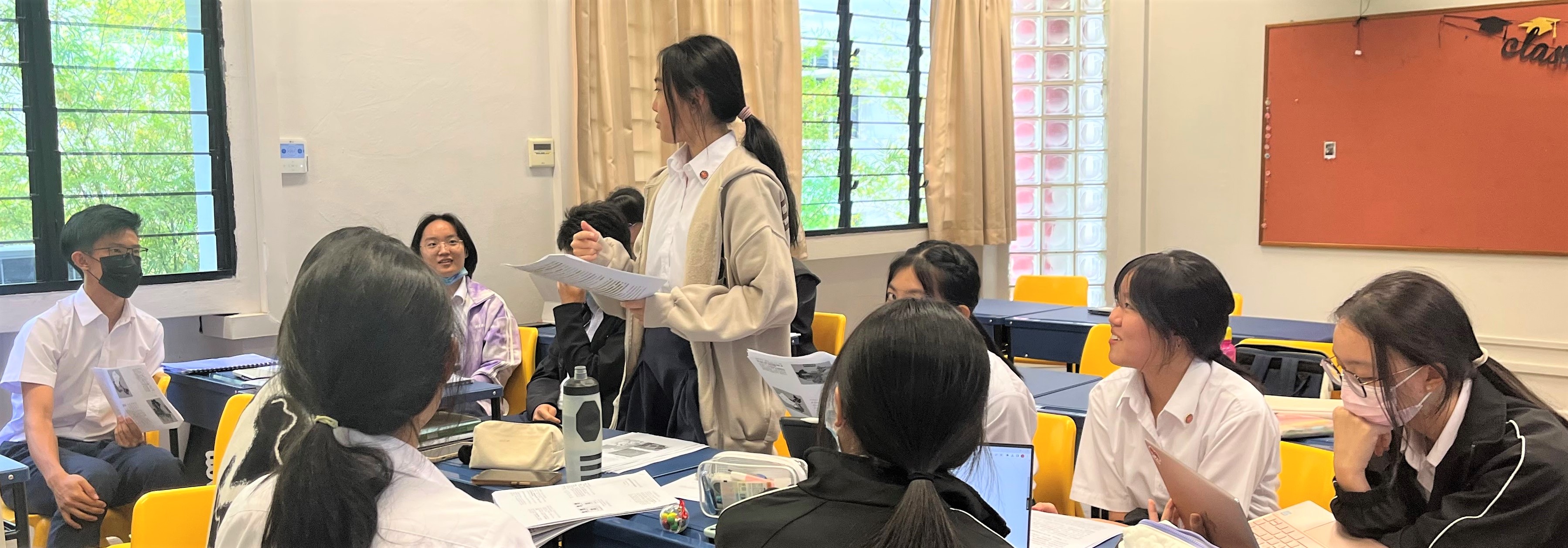
Assessment is not limited to traditional written tests but includes both formative and performance-based evaluations that value students' learning processes and real-world application. Common assessment approaches include:
-
Oral presentations and role-play (e.g., mock trials, debates, storytelling)
-
Project-based assessments (group presentations, research tasks, creative showcases)
-
Writing assignments (creative writing, literary critique, reflective journaling)
-
Classroom observations and learning behaviour tracking
-
Peer assessment and self-evaluation (e.g., group reflections, personal learning logs)
-
Multimodal submissions (e.g., video production, visual graphics, interactive Q&A)
These varied assessment strategies motivate students to engage meaningfully with the subject, provide teachers with a fuller picture of each learner’s progress, and foster authentic use of the language in real-life contexts.
我们采用多元化的评估与练习方式,以全面了解学生在语言能力、文本理解、批判性思维与表达能力等方面的发展。评估不再局限于传统的笔试,而是结合过程性评估与表现性评估,关注学生的学习过程、思考深度和实际应用能力。
常见的评估方式包括:
-
口语表达与角色扮演(如模拟法庭、辩论演说)
-
项目式汇报(小组展示、研究报告、创作分享)
-
写作任务(创意写作、文学评论、反思日志)
-
课堂观察与学习表现记录
-
同侪评量与自我评估(如小组互评、个人成长记录)
-
多模态呈现(影片制作、视觉图像、互动问答等)
这些多元评估方式能更有效地激发学生的学习动机,帮助老师全面掌握学生的学习状态,并鼓励学生在真实语境中运用所学,达致“学以致用”的教学目标。

